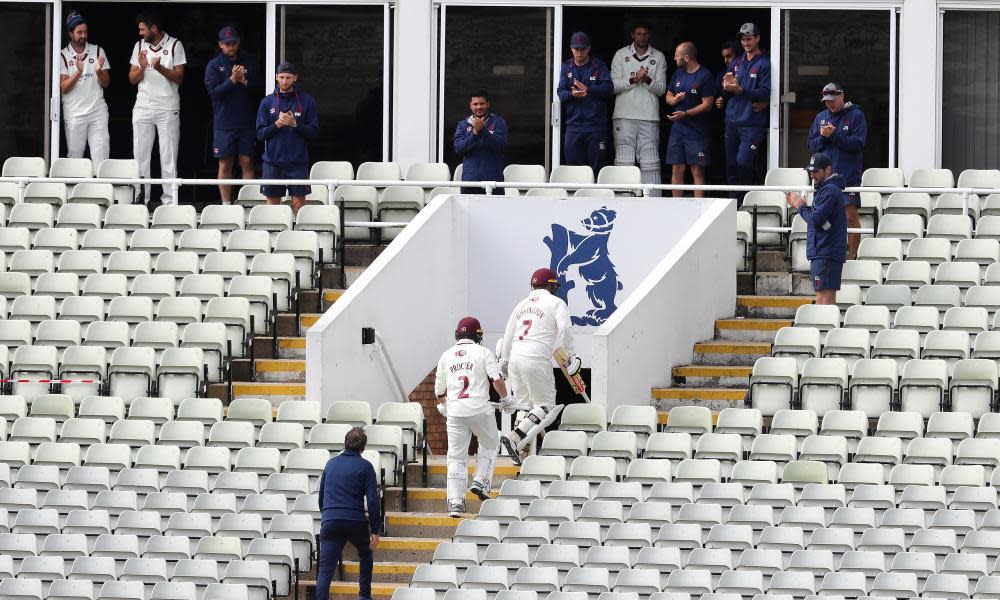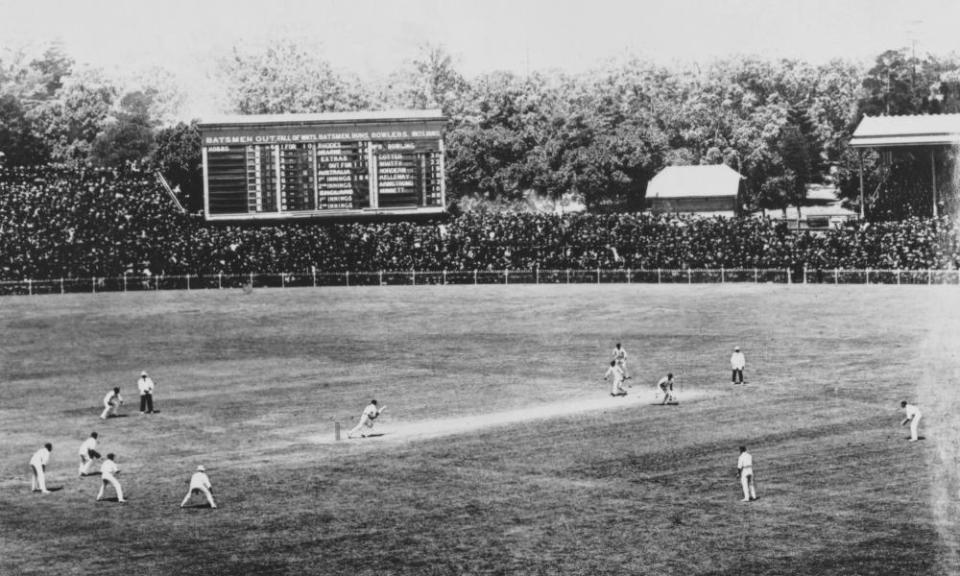Cricket has been infected with a bad decision-making virus this summer

One great controversy has divided the sports-watching nation this sad summer. There can be no abstentions on this. Fake crowd noise on TV? Yes or no? My answer, to my own astonishment, is yes – even after spending decades at loud sports events, in old-tech days screaming urgent newspaper copy down bad telephone lines, and wishing everyone else would just shaddup.
Last Sunday, I was at Edgbaston watching Warwickshire play Northamptonshire. There were five of us in the press box, at the top of the spectacular newish pavilion, a handful of radio blokes downstairs. A single photographer had camped in the Hollies stand. Sometimes a member of the groundstaff would appear briefly on the far side. The Warwickshire dressing room, invisible below us, applauded their teammate Tim Bresnan’s fifty and hundred. Otherwise, silence.
Related: Learie Constantine and a thread that runs through West Indies cricket history | Andy Bull
I wandered outside to the deserted top deck. There were fluffy flat-bottomed clouds over Birmingham, which from here scrubs up surprisingly well in sunshine. There was no sound except for a hum from the air conditioning. It was dystopian, disconcerting and deeply depressing. If a wicket falls at Edgbaston and no one hears, does it make a sound?
Now it is true that play at Edgbaston has taken place with near-empty stands before now (county cricket: supplying your social distancing requisites since 1890). But Sunday was meant to be different. A pilot friendly with spectators had been staged a few days earlier; the sports minister had turned up and made complimentary noises; clearance had been given for 2,500 to be admitted on both Saturday and Sunday.
Then the government clamped down in a panic. Beaches were still packed; airports ditto; the young were lurching from pub to pub spreading joy, laughter and germs. Edgbaston, no. Right now I wouldn’t have fancied a session at the claustrophobic Crucible. But here? In the open, everything controlled, with one-tenth of the real capacity. Oh, c’mon.
Journalists can sometimes tread where others cannot, and county cricket is one of those. But don’t envy me: cricket is sociable or it is nothing. Otherwise, best to stick to the TV, even if it does make the response to Fulham winning promotion sound much the same as an early-morning single nudged to fine-leg.
Cricket itself is also infected with the bad decision-making virus, not for the first time. The ersatz 2020 Championship is called the Bob Willis Trophy: the 18 teams split into three groups, playing five games each – but only two group winners qualify. This means that about half of the teams will be totally out of it halfway through their season. And a one-off final in first-class cricket, where the draw option is essential to the plot, is an inherently crap idea.
OK, this is a difficult year and winter is coming; something had to be cooked up fast. But Willis had his own vision of the future and this tournament looks suspiciously like it; it is not one shared by many of those who want a cricketing structure that is national, viable and bears some relation to tradition. Bob died in December, aged 70. He was a great fast bowler and a nice man with a fertile mind. He deserves a statue, preferably showing him in full flight. Future generations would gaze in awe, not tear it down.
But he’s the wrong fit for this trophy; Willis was never really a county cricketer. He was one of the first players, perhaps the first, to make a conscious decision to subordinate his game at that level to the overriding task of playing Tests. With his fragile body and his unique action, with about a million moving parts, he was right to do so. Over 16 seasons and 149 Championship matches he took 386 wickets, including scaredy-cat 1970s tailenders, compared to 325 in 90 Tests against the best. His average was worse, too. Once, as Warwickshire captain, Bob belatedly brought himself on to try and end a stubborn partnership. “Bowler’s name?” yelled a Brummie voice from the stands.

Equally inappropriate is the graceless junking of the 57-year-old Wisden Trophy for Tests between England and West Indies in favour of the “Richards-Botham Trophy”. I declare a vague interest as a former editor of the almanack who once lugged the now discarded object (much, much heavier than the Ashes) to Antigua and back to present it to Brian Lara.
This was a kneejerk, top-down decision, influenced by the current febrile mood, and stupid because (a) there is already a Viv Richards Trophy, contested by West Indies and South Africa; (b) Botham’s record against West Indies was feeble and his captaincy woeful; (c) his new lordship has had enough scantly deserved honours of late; (d) the alternative suggestion of naming it after the more appropriate Lord Constantine was dismissed, ignorantly; (e) there is no record of John Wisden, the almanack’s founder, having any unacceptable views on anything; and (f) any change to the name of a well-established sporting contest diminishes it – remember the once incredibly successful Gillette Cup? It was not wholly coincidental that it withered after the sponsorship changed.
As it happens there was a better alternative to the Willis Trophy, too. I would have named it after a man who epitomised all the virtues of English county cricket. He was the only man ever to take 4,000 first-class wickets. In the Championship, he took eight times as many wickets as Willis and scored 20 times as many runs.
He was revered throughout his career (1898-1930) in Yorkshire and beyond. I don’t suppose anyone in power at Lord’s has heard of him. He deserves recognition also as recompense to the thousands of guiltless people who share his surname and have been tormented these past few weeks.
His name was Rhodes. Wilfred Rhodes. No relation.


